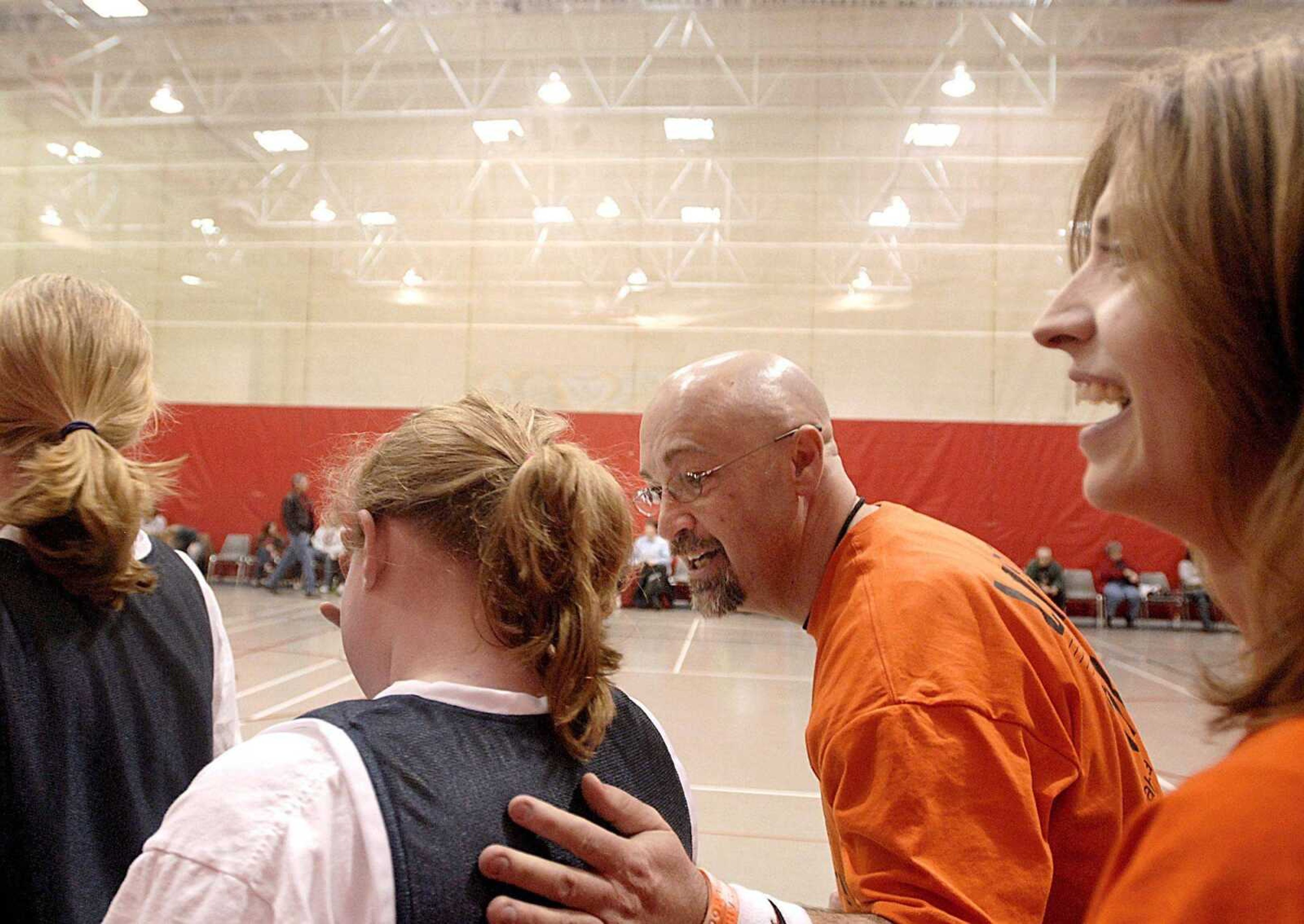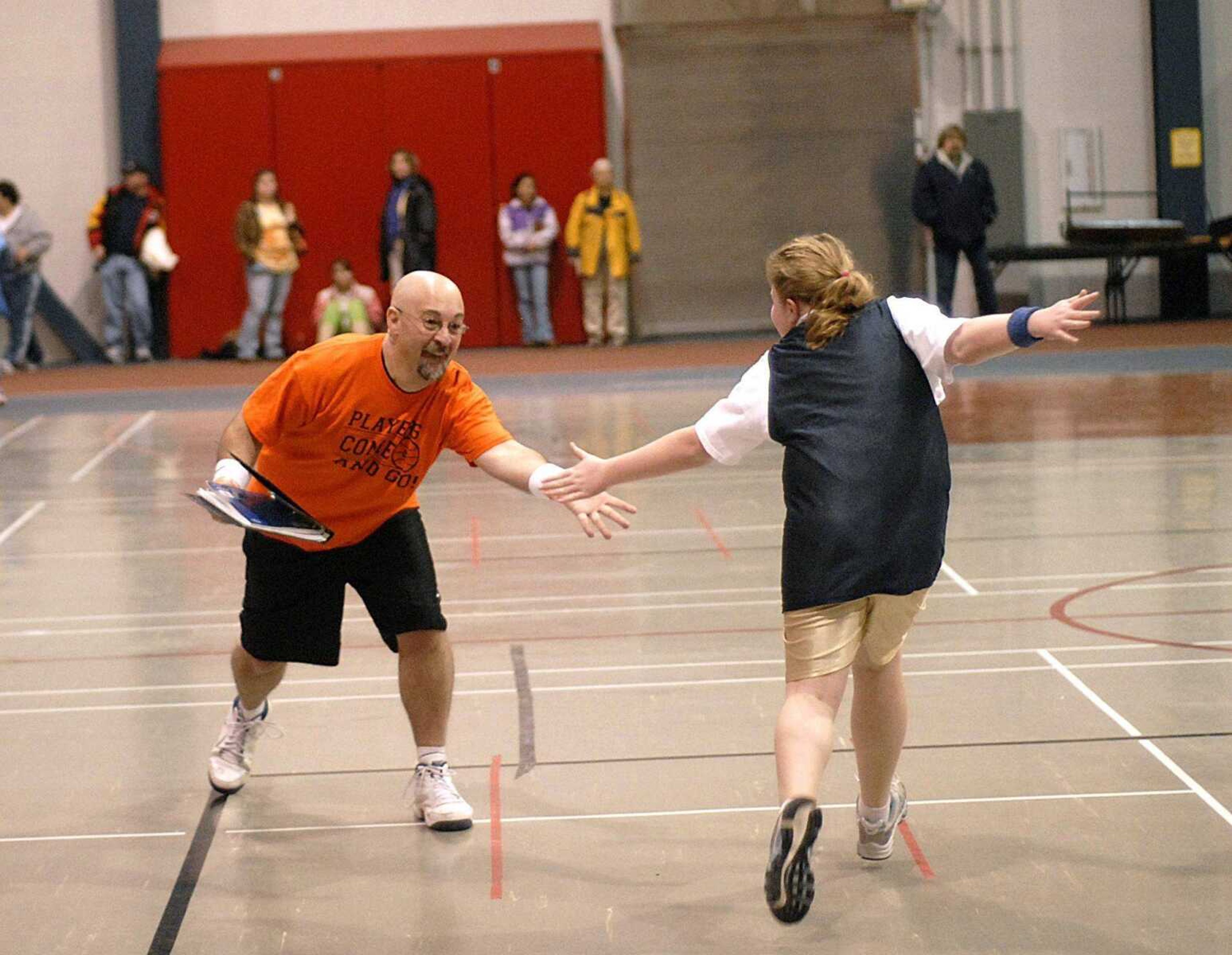Basketball team completes undefeated season in Sahara Aldridge's memory
As red and yellow bulbs twinkled and "Let's Get Ready to Rumble" cracked over the speakers, each player of the Lady Mercury basketball team strained to hear her name, individually jogging through a makeshift tunnel to their parents' clapping beat...
See a slide show with sound about the team and Sahara.
As red and yellow bulbs twinkled and "Let's Get Ready to Rumble" cracked over the speakers, each player of the Lady Mercury basketball team strained to hear her name, individually jogging through a makeshift tunnel to their parents' clapping beat.
Shannon Aldridge paused when it was time to introduce the Lady Comets. "This year we have something different. We have a team united as one," he announced. Six players pushed through the fog, emerging as a unit.
For Aldridge, it was a symbol of how no player was above another, and more importantly, how no one was playing for themselves.
Before joining his team, Aldridge glanced at his coach's notebook, at a picture of himself and his daughter carefully tacked onto a front inside page. It's the last basketball picture he and Sahara had taken together, and shows the two of them smiling and gripping a ball. Sahara is wearing a hat to cover her naked head, her hair lost to chemotherapy. She appears slightly heavier than in other pictures, but the steroids that would eventually weaken her heart and make her gain 60 pounds have not entirely kicked in.

Aldridge hadn't been sure he could lead a basketball team this season, and had originally said no. Reminders of his only child were still everywhere and frequently brought him unexpectedly to tears. A self-proclaimed basketball fanatic, he hadn't played since before Nov. 5, when 13-year-old Sahara died.
While he thought about Sahara nonstop, the only place he could feel her presence was on the court. The Redhawks' season was winding down, and Saturday was the final game of the season for the church-league team he eventually decided to coach. He didn't want the feeling to end, and worried about the conclusion of the season. "Where am I going to feel her after that?" he asked himself.
But standing in the chilly gym, Aldridge didn't have time to second guess himself. The Comets were going for an undefeated season, the first for their division in league history. Last year the team lost the final game by two points, crushing their perfect season. It was the third time Aldridge, with a record of 55 and 7, had come only one game away from making history.
0-0
"Defense wins games," he told the team before the game started. "You know how to do it. We are one hour away from doing something no one has ever done."
The players put their hands into a circle, and chanted "Hoops" on three.
Almost everyone close to Sahara called her "Hoops," a reference to her unwavering love of the sport. At 3, Sahara was dribbling the ball between her legs, and by 9 she could make a three-point shot. She attended every sports camp offered at Southeast Missouri State University, and was trained by some of the most well-known coaches in the area.
Aldridge chuckles while remembering a time he had to shovel the driveway in order for their daily practice at their Cape Girardeau home; Sahara religiously practiced, rain or shine.
"Hoops had a desire for the game, and she worked very hard. If she couldn't do something she'd go home and practice until she was the best one doing it," said Brittany Perkins, a former ballgirl with Sahara for Southeast's women's basketball team and also a player for the Lady Comets.
Within the first two minutes of the game, Perkins had stolen the ball and scored on a layup.
6-2
The team started slow, and did not catch as many rebounds as they should have, Aldridge fretted as the second of six periods started.
He studied Perkins on the court, and couldn't get over how much she reminded him of Sahara. The best friends had a similar style, being trained by the same coaches, and both were point guards.
The two met in third grade at a basketball camp, but were originally enemies, eyed by each other as competitors. But when a ball was intentionally chucked at Perkins when she wasn't looking, Sahara threw it back at the boy, saying, "Don't mess with my friend."
From then on, the girls were buddies, exchanging jokes on the court, sharing a love for Dairy Queen, and "thinking we were so awesome" when, as ball girls, they would give a high-five to a Southeast player.
Perkins wore an orange Central hoodie to the game Saturday, formerly Sahara's.
Perkins had been so distraught by Sahara's death she couldn't attend the funeral, worried she wouldn't be able to make it through.
She still thinks about Sahara daily, but uses her "more as an inspiration for everything I do. I'll think, let's make it a good practice for Hoops."
Collectively, the team dedicated the season to Sahara.
14-6
While plays had picked up, Aldridge would have liked a greater lead going into the third period. In past games, the team on average had only been giving up 16 points, but were scoring 50.
Aldridge paced the court, wearing a shirt that said "players may come can go, but legends live forever." Eight bracelets that read "Hope for Hoops," one for each game, adorned his arm. Thousands of the bracelets were sold last year to help pay medical expenses for Sahara.
Adelyn Petzoldt, the team's top offensive player, sat on the sidelines, recovering from a fall on the ice the day before.
Aldridge knew the game wasn't about the score but the experience. He liked Upward because it was a church league, and he could impart words of wisdom. Over his six years as coach, he had helped girls who had suffered abuse or dealt with a family divorce. Now, he knew the team was helping him more than he was helping them.
His players had shown up to his baptism in October 2006, and he and Amy, his wife, intended to take them to the Redhawks basketball game Saturday night and out for pizza Monday.
Even though the team had been assigned by a computer, he marveled at how well the players worked together, and how they had a common vision.
Amy Aldridge, his assistant coach, explained the different personalities: There was a book worm, a former cheerleader, two rookies and two sisters. But somehow they made it work.
23-6
By halftime the team had found its rhythm and had held the Lady Mercury scoreless. Players laughed when one player jokingly called an opponent a "gorilla" for holding onto her arm.
Sahara, too, was always joking and making people laugh, Perkins said. Even after the brain-stem cancer had been identified, on her 12th birthday, she remained upbeat and positive, rarely complaining, friends say.
The community showed an outpouring of support. Nearly 600 people attended her funeral, and she touched thousands of others around the world through a blog set up by a family friend.
Aldridge tells people Sahara got his wife's good looks and smarts, and his outgoing personality and athleticism.
Sahara had been a healthy child, hardly ever catching a cold, and basketball training had made her strong and muscular. That made her diagnosis even harder to accept, Amy Aldridge said.
Over the 17 months from Sahara's diagnosis to her death, Amy spent countless hours, sometimes until 3 in the morning, researching cancer and looking for doctors. Sahara was treated in both Houston and in California, where she had 70 percent of the tumor removed. The doctors deserve praise, Amy Aldridge said; Sahara's body had just been too weak to go on any longer.
25-10
Players were starting to get tired, and sweat shone on several of the girls' foreheads. Aldridge enforced the basics: If you can't shoot over someone, shoot around them; do not turn your back; and get those rebounds.
Only 15 minutes remained before a perfect season could be recorded. He thought about how far he had come.
Recovery has been a slow and painful process. Sometimes he sits on Sahara's bed and cries. Her room remains the same, although some of her clothes have been given away.
He is careful not to sound sorry for himself, although he knows he could be depressed. The void is undeniable, and he and Amy often wonder what to do with their time. Basketball has helped, and some of Sahara's friends still come to visit.
But even a simple walk through the neighborhood can bring such a flood of memories it is difficult to continue.
"I didn't lose everything, but I lost the most important thing," Aldridge said.
His biggest concern is keeping Sahara's memory alive.
The score continues to increase. 27-14. 32-14. And finally, before the buzzer, 35-14.
Sahara was number 21 every year. Aldridge couldn't help but notice the Lady Comets had won by 21 points.
lbavolek@semissourian.com
335-6611, extension 123
Connect with the Southeast Missourian Newsroom:
For corrections to this story or other insights for the editor, click here. To submit a letter to the editor, click here. To learn about the Southeast Missourian’s AI Policy, click here.










